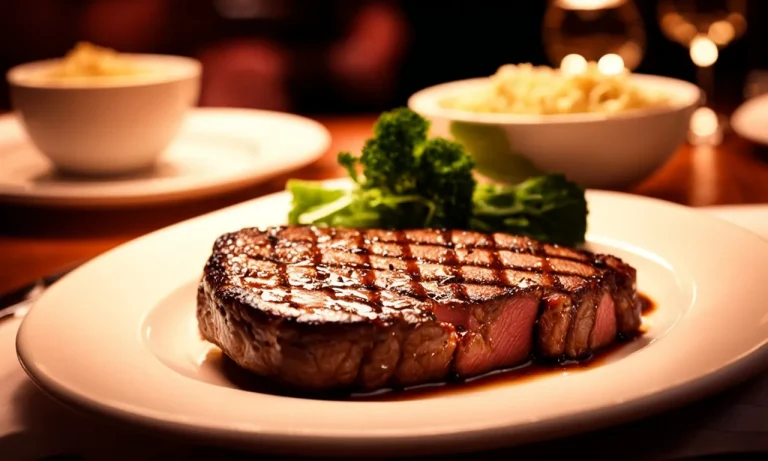Quitting a job is never easy, especially one in the fast-paced restaurant industry. As a server, bartender, host, chef, or other restaurant worker, you play a vital role in running a smooth operation. So when you decide it’s time to move on, you’ll want to exit gracefully without burning bridges.
If you’re short on time, here’s a quick answer to your question: Give proper notice, work your remaining shifts, train your replacement, return uniforms/keys, get your last paycheck, and leave on good terms with a resignation letter.
In this comprehensive guide, we’ll go over the proper protocols, tips, and strategies for professionally quitting your restaurant job. You’ll learn how much notice to give, what to say to your boss, how to handle your remaining shifts, who to notify, the process for getting your last paycheck, and more.
We’ll also cover common mistakes to avoid so you can leave your job with your reputation and relationships intact.
Give Adequate Notice
When it comes to quitting a restaurant job, giving adequate notice is crucial. It not only shows professionalism but also helps in maintaining a good relationship with your employer. The standard notice period in most industries is two weeks, but it’s always a good idea to check your employee handbook or contract for any specific guidelines regarding notice periods.
Two weeks notice is standard, but check your employee handbook
In most cases, giving a two weeks notice is considered standard practice. This gives your employer enough time to find a replacement and ensure a smooth transition. However, it’s important to familiarize yourself with your employee handbook or contract to see if there are any specific requirements or expectations regarding notice periods.
Important positions may require more notice
If you hold a crucial position in the restaurant, such as a manager or head chef, it may be necessary to provide more than two weeks notice. This is because finding a suitable replacement for such positions can take longer and require additional training.
By giving your employer ample time to find a replacement, you are helping to ensure the continued success of the business.
Don’t burn bridges by quitting abruptly
While it may be tempting to quit your restaurant job on the spot, it’s important to resist the urge. Quitting abruptly without giving any notice not only leaves your employer in a difficult position but also reflects poorly on your professionalism and work ethic.
It’s always better to part ways on good terms, as you never know when your paths may cross again in the future.
Have a Conversation with Your Boss
When it comes to quitting a restaurant job, it’s important to have a conversation with your boss. This allows you to communicate your decision professionally and ensures that there are no misunderstandings. Here are some dos and don’ts to keep in mind:
Request a meeting to resign in person
It’s always best to resign in person rather than via email or text. Request a meeting with your boss to discuss your decision to leave the restaurant. This shows respect and allows for a more personal conversation.
Remember, quitting a job is a big decision, and it’s important to handle it professionally.
Keep it short, positive, appreciative
During your conversation with your boss, keep your resignation message short, positive, and appreciative. Thank them for the opportunities and experiences you gained while working at the restaurant. Express your gratitude for the skills you acquired and the relationships you built with colleagues and customers.
This will leave a positive impression and help maintain a good professional reputation.
Offer to help with the transition
When quitting a restaurant job, it’s considerate to offer your assistance with the transition. Let your boss know that you are willing to help train a replacement or provide any necessary information to ensure a smooth handover.
This gesture demonstrates your professionalism and commitment to leaving on good terms.
Get contact info for final paycheck
Before leaving, make sure to collect the necessary information to receive your final paycheck. Double-check with your boss or the HR department to ensure that all your hours worked and any outstanding payments are accounted for. It’s essential to leave on good financial terms as well.
Remember, quitting a job can be a delicate situation, and handling it properly can make a significant difference in your professional reputation. By having a conversation with your boss, keeping it positive and appreciative, offering to assist with the transition, and securing your final paycheck, you can leave your restaurant job on good terms and with your head held high.
Work Your Remaining Shifts
When quitting a restaurant job, it is important to work your remaining shifts until your official departure date. This shows professionalism and respect towards your employer, coworkers, and customers. Here are some dos and don’ts to keep in mind when it comes to working your remaining shifts:
Honor your posted schedule
One of the most important things to do when quitting a restaurant job is to honor your posted schedule. This means showing up on time and being ready to work for each shift. By doing so, you are demonstrating your commitment and reliability, and you are also ensuring that the restaurant can continue to operate smoothly.
Don’t call out or slack off
While it may be tempting to call out or slack off during your remaining shifts, it is important to resist the urge. This behavior not only reflects poorly on you, but it also puts additional stress on your coworkers who may have to pick up the slack.
Remember, even though you may be leaving, it is still important to maintain a professional attitude and work ethic until the very end.
Offer to cover if short staffed
If you want to go above and beyond during your remaining shifts, consider offering to cover for your coworkers if they are short-staffed. This gesture shows that you are a team player and willing to help out even after giving your notice.
It can also leave a positive impression on your employer, potentially leading to a positive reference in the future. However, make sure not to overextend yourself and only offer to cover if you are able to do so without compromising your own well-being or other commitments.
Remember, the way you handle your remaining shifts can leave a lasting impression on your employer and coworkers. By honoring your schedule, avoiding calling out or slacking off, and offering to cover if short-staffed, you can ensure a smooth transition and maintain a positive professional reputation.
Train Your Replacement
When quitting a restaurant job, it is important to ensure a smooth transition for both your employer and your replacement. One of the best ways to do this is by offering to train any new hires that come in after you leave.
By doing so, you can pass on your knowledge and expertise, helping them get up to speed faster. This not only benefits your replacement but also demonstrates your professionalism and willingness to go the extra mile.
Offer to train new hires if possible
If your employer is open to the idea, offer to train any new hires that come in after you leave. This can be done by shadowing you during your shifts or setting aside dedicated time for training sessions.
By sharing your experience and knowledge, you can help new employees learn the ropes and become proficient in their roles more quickly. This can also help alleviate any concerns your employer may have about the transition.
Leave thorough notes about your responsibilities
In addition to training your replacement in person, it is also helpful to leave thorough notes about your responsibilities. These notes should include important tasks, procedures, and any other information that would be helpful for your replacement to know.
This ensures that they have a reference point to turn to if they have any questions or need guidance. Leaving detailed notes shows your dedication to ensuring a smooth transition and helps prevent any disruptions in the workflow.
Introduce replacement to regulars if applicable
If you have built relationships with regular customers during your time at the restaurant, consider introducing your replacement to them. This can help ease the transition for both your replacement and the regulars, as they will feel more comfortable knowing that someone new is taking care of them.
Introducing your replacement can also help your replacement establish rapport with the customers, ensuring that they continue to receive excellent service even after you have left.
Remember, training your replacement is not only beneficial for the smooth operation of the restaurant but also reflects positively on your professionalism and work ethic. By going the extra mile to ensure a smooth transition, you leave on a positive note and maintain a good reputation in the industry.
Return Company Property
When quitting a restaurant job, it’s important to handle the return of company property in a professional and responsible manner. This includes items such as keys, uniforms, and equipment that were provided to you during your employment.
Turn in keys, uniforms, equipment
One of the first things you should do when leaving a restaurant job is to return any keys that were issued to you. These keys may include those for the front door, storage areas, or any other access points.
Returning the keys ensures that you no longer have access to the restaurant’s premises and protects the security of the establishment.
Additionally, you should return any uniforms or equipment that were provided to you. This includes items like aprons, chef jackets, and any specialized tools or machinery. Returning these items allows the restaurant to maintain their inventory and ensures that future employees have the necessary resources for their roles.
Settle up any outstanding tabs
If you have any outstanding tabs or debts with the restaurant, it’s important to settle them before leaving. This could include unpaid bills for meals consumed during your employment or any other financial obligations you may have with the establishment.
By settling any outstanding tabs, you demonstrate professionalism and integrity. It also helps maintain a positive relationship with your former employer and colleagues, which can be beneficial for future references or networking opportunities.
Confirm final paycheck details
Before leaving your restaurant job, make sure to confirm the details regarding your final paycheck. This includes verifying the amount you are owed, the method of payment, and the date it will be issued.
It’s important to ensure that you are compensated for all the hours you have worked, including any overtime or tips that may be owed to you. If there are any discrepancies or concerns regarding your final paycheck, address them with your employer or the appropriate department to resolve the matter.
Remember, returning company property and settling any outstanding obligations are essential steps to take when quitting a restaurant job. By handling these aspects with professionalism and integrity, you leave on good terms and maintain a positive reputation within the industry.
Leave a Resignation Letter
Submit a formal letter to manager
When quitting a restaurant job, it is important to leave a resignation letter to your manager. This formal document serves as a professional way of informing your employer about your decision to leave the job. The resignation letter should be clear, concise, and respectful in tone.
It should include the date of your resignation, your position in the restaurant, and the last day you intend to work. Make sure to keep a copy of the resignation letter for your records.
Thank them for the opportunity
In your resignation letter, it is essential to express your gratitude to your manager for the opportunity to work at the restaurant. Thank them for the experience, the skills you have acquired, and the relationships you have built during your time there.
This shows your professionalism and appreciation for the work environment.
Provide contact info
Include your contact information in the resignation letter so that your employer can reach you if needed. This includes your phone number, email address, and any other relevant contact details. Providing this information ensures that your employer can easily get in touch with you for any further questions or to discuss the transition process.
Offer help if needed
As a sign of goodwill, you can offer assistance during the transition period. This can include training your replacement, providing guidance on ongoing projects, or helping with any necessary handover tasks.
By offering your support, you demonstrate your professionalism and commitment to ensuring a smooth transition for the restaurant.
Remember, leaving a restaurant job on good terms is essential for maintaining a positive professional reputation. By following these dos and don’ts when leaving a restaurant job, you can ensure a respectful and smooth departure.
Conclusion
Quitting a restaurant job doesn’t have to be stressful if you follow proper etiquette. Give adequate notice, have a polite conversation with your boss, work your remaining shifts diligently, help train your replacement, return any company property, and leave a resignation letter.
This ensures a smooth transition so you can move on from your job gracefully. With the right preparation and professionalism, you can quit without burning any bridges in the restaurant industry.






